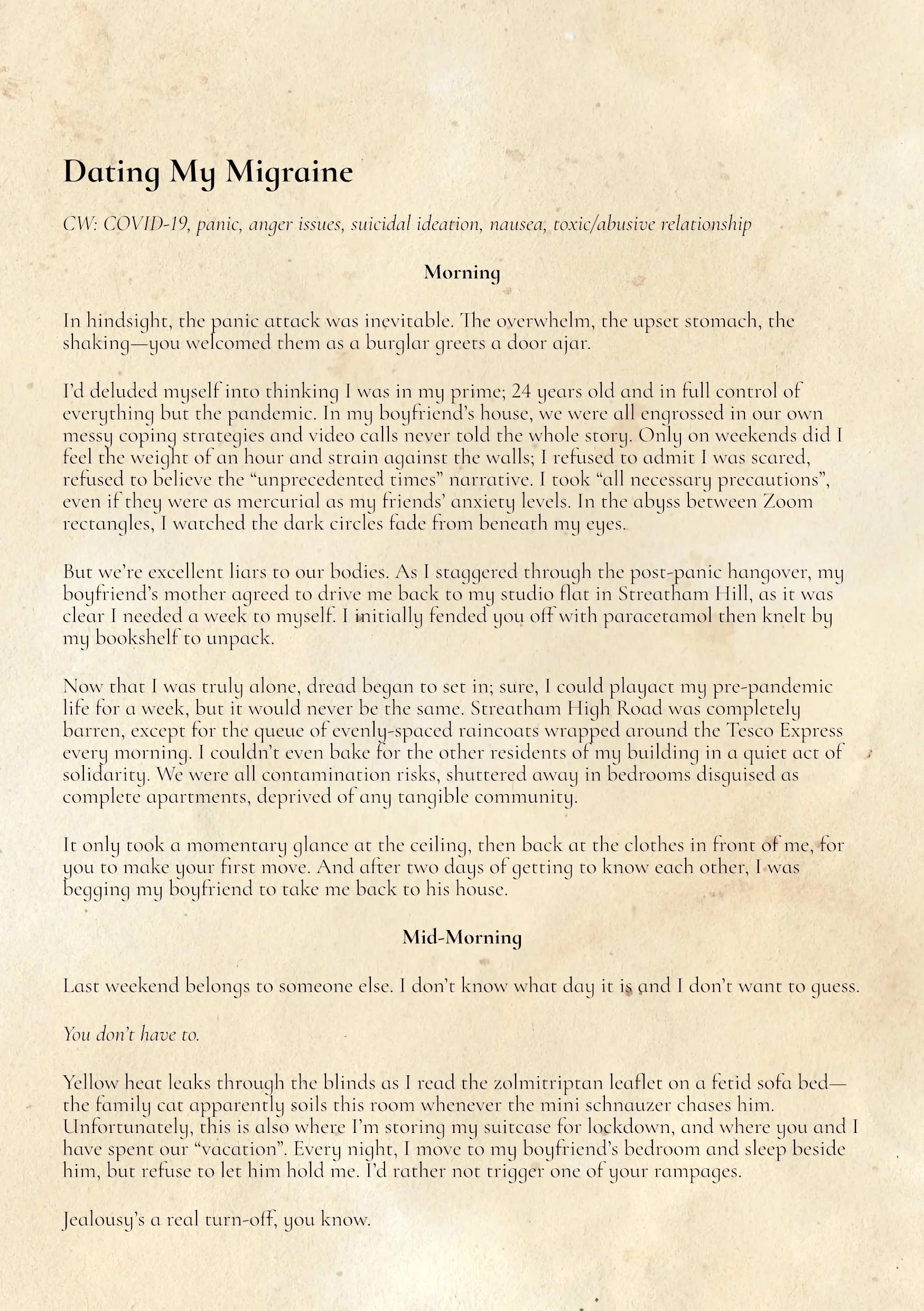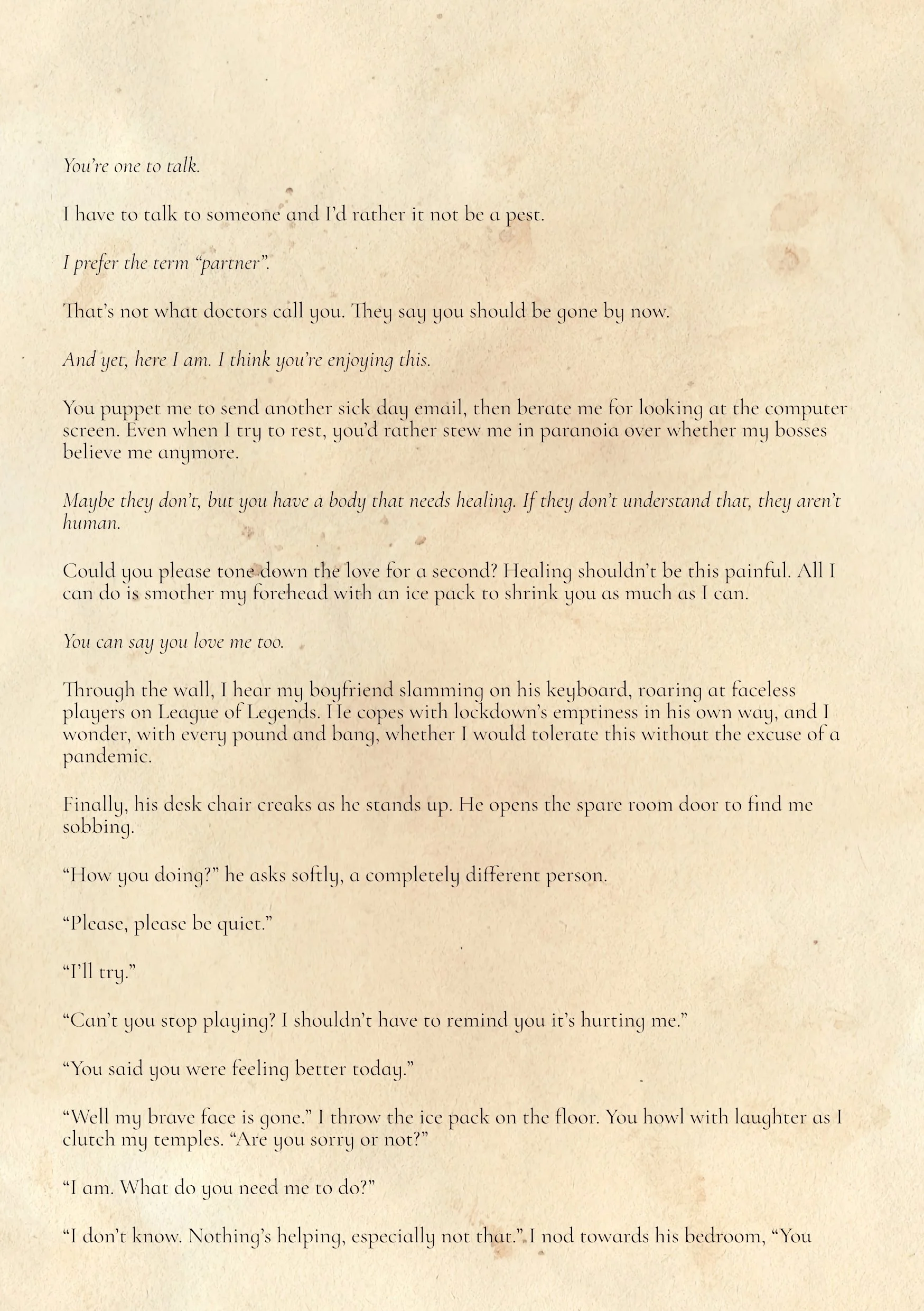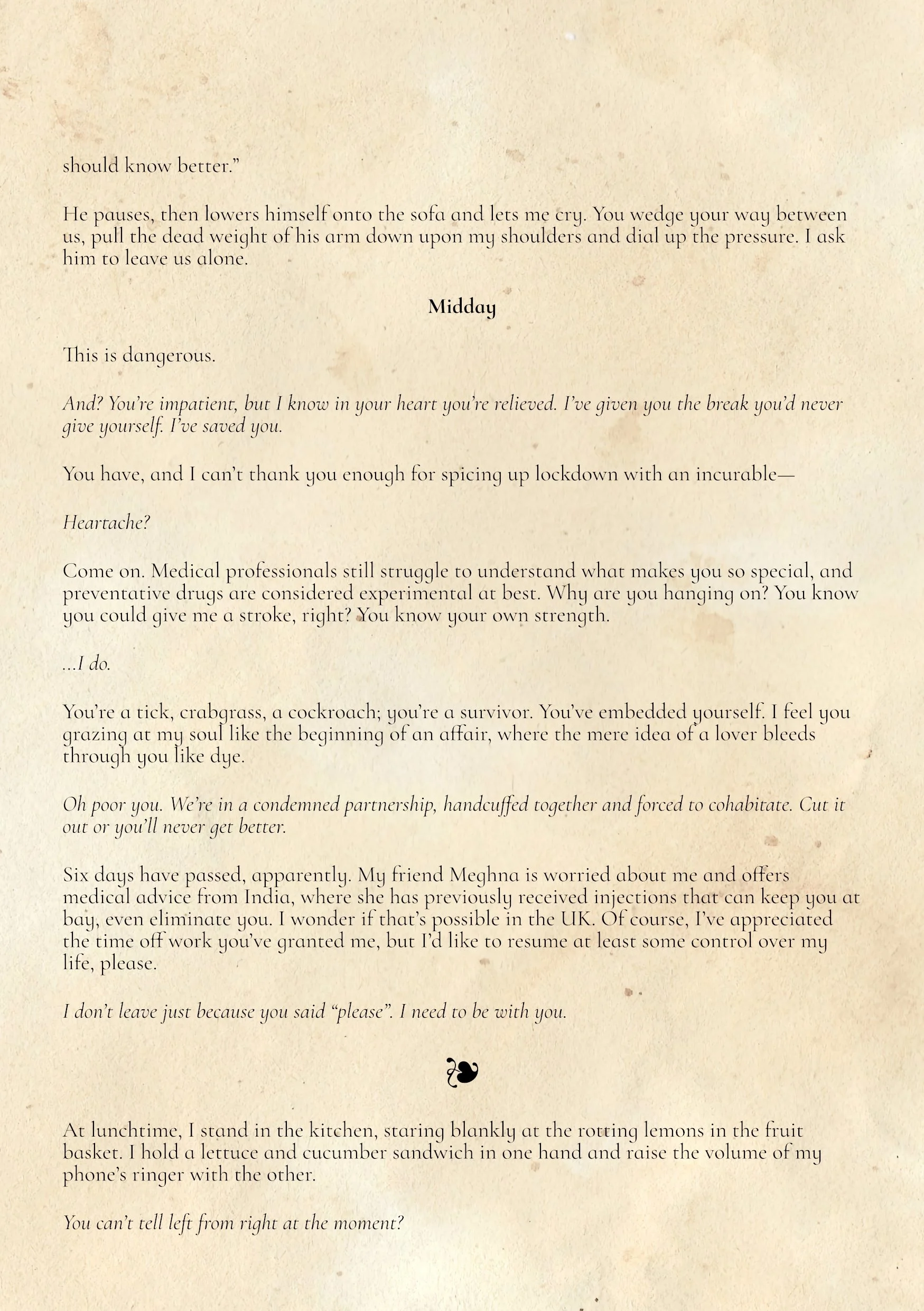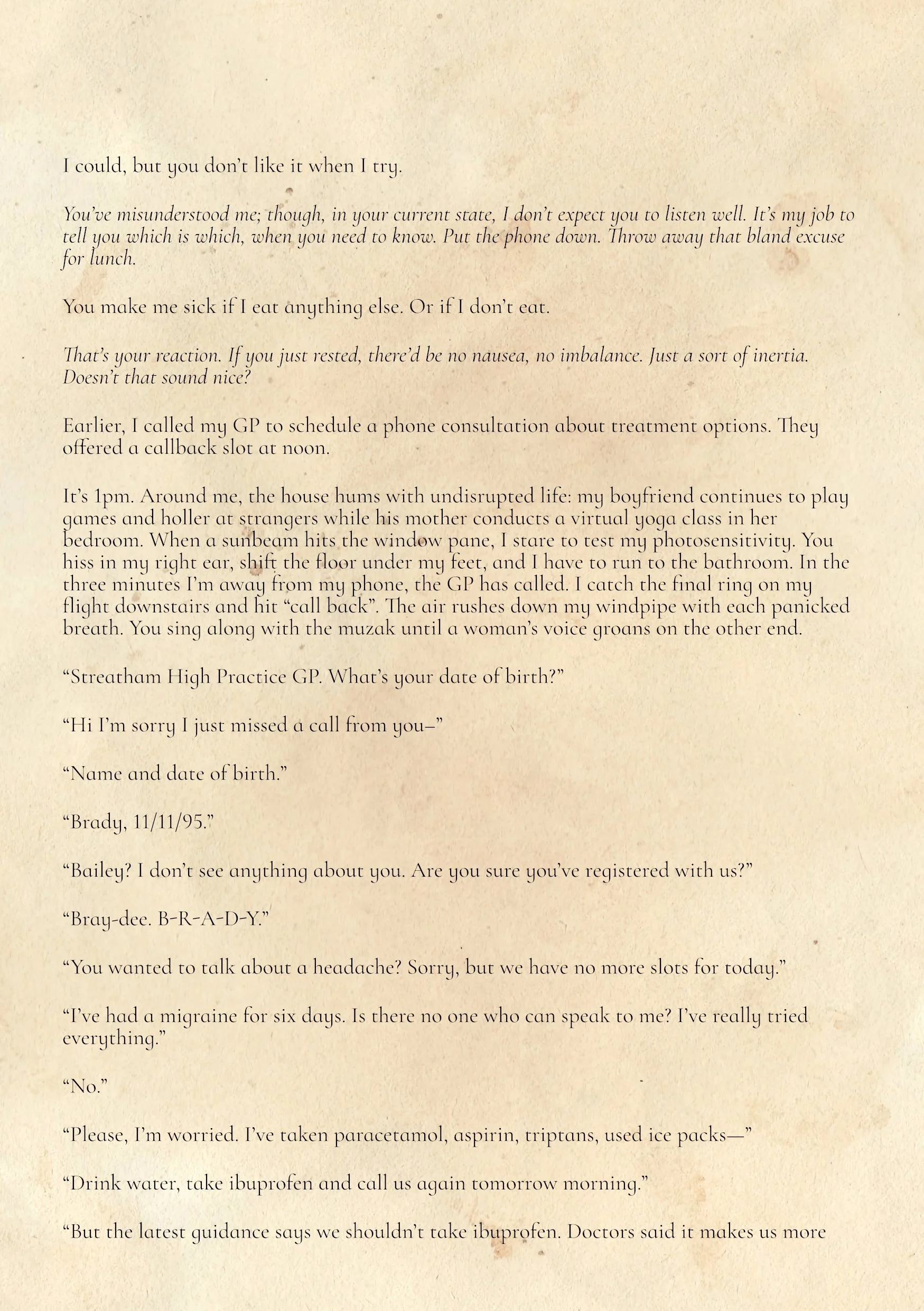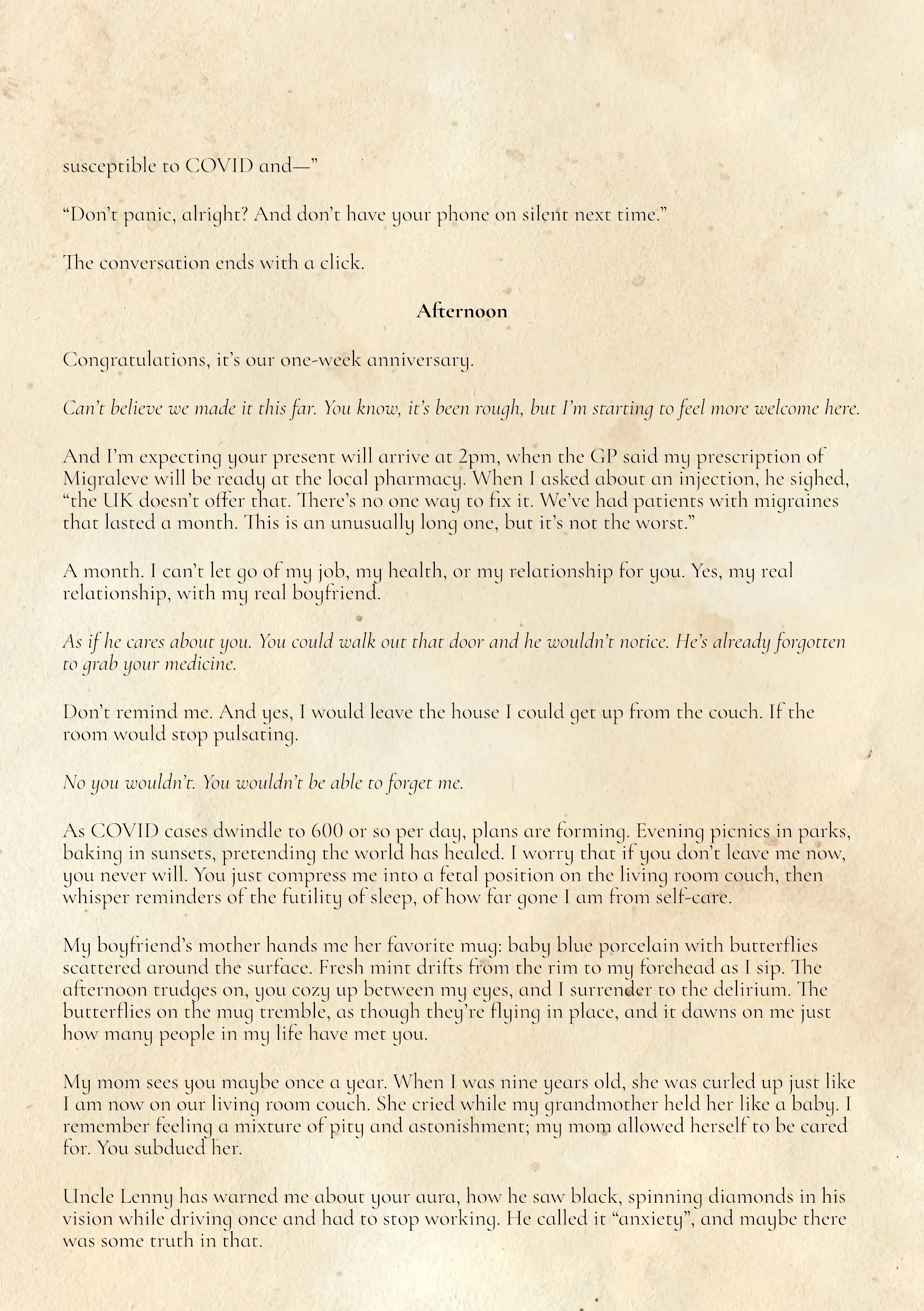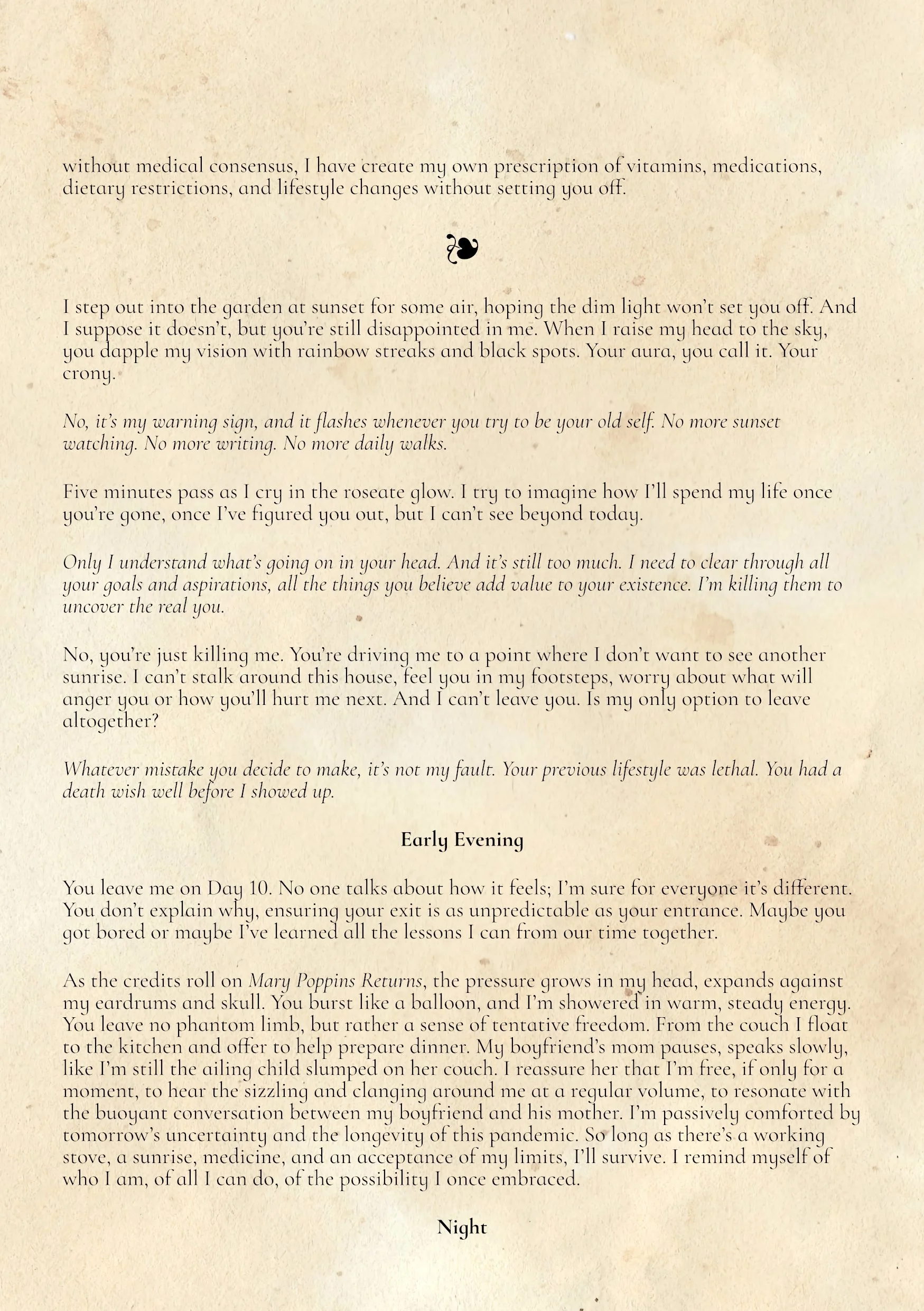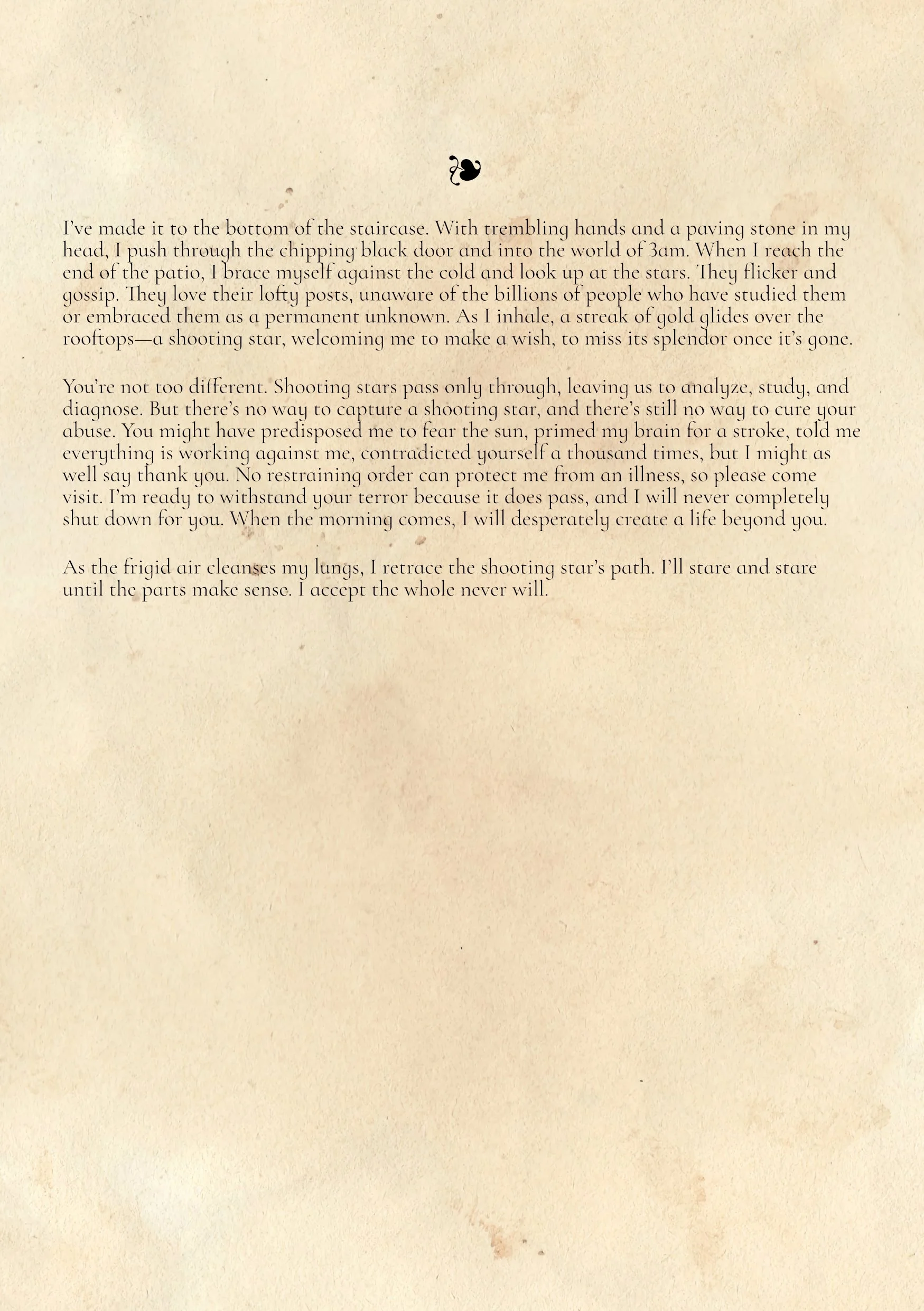Michaela Brady
Michaela's writing explores belonging, mis/communication, grief and mental health. Originally from NYC, she moved to the UK to pursue a master's at Oxford University and has lived there since. Her work is featured in Blood + Honey, Clepsydra, Harrow House Journal, Candlelit Chronicles, BarBar, GROUND Journal and Feast Zine, among others. Recently, she was shortlisted for Femmesocial Press's poetry contest, was a featured poet in the Oxford Di-Verse Poetry Festival, and a finalist in the 2024 London Independent Story Prize.
Easy read of the story in the images above:
Dating My Migraine
CW: COVID-19, panic, anger issues, suicidal ideation, nausea, toxic/abusive relationship
Morning
In hindsight, the panic attack was inevitable. The overwhelm, the upset stomach, the shaking—you welcomed them as a burglar greets a door ajar.
I’d deluded myself into thinking I was in my prime; 24 years old and in full control of everything but the pandemic. In my boyfriend’s house, we were all engrossed in our own messy coping strategies and video calls never told the whole story. Only on weekends did I feel the weight of an hour and strain against the walls; I refused to admit I was scared, refused to believe the “unprecedented times” narrative. I took “all necessary precautions”, even if they were as mercurial as my friends’ anxiety levels. In the abyss between Zoom rectangles, I watched the dark circles fade from beneath my eyes.
But we’re excellent liars to our bodies. As I staggered through the post-panic hangover, my boyfriend’s mother agreed to drive me back to my studio flat in Streatham Hill, as it was clear I needed a week to myself. I initially fended you off with paracetamol then knelt by my bookshelf to unpack.
Now that I was truly alone, dread began to set in; sure, I could playact my pre-pandemic life for a week, but it would never be the same. Streatham High Road was completely barren, except for the queue of evenly-spaced raincoats wrapped around the Tesco Express every morning. I couldn’t even bake for the other residents of my building in a quiet act of solidarity. We were all contamination risks, shuttered away in bedrooms disguised as complete apartments, deprived of any tangible community.
It only took a momentary glance at the ceiling, then back at the clothes in front of me, for you to make your first move. And after two days of getting to know each other, I was begging my boyfriend to take me back to his house.
Mid-Morning
Last weekend belongs to someone else. I don’t know what day it is and I don’t want to guess.
You don’t have to.
Yellow heat leaks through the blinds as I read the zolmitriptan leaflet on a fetid sofa bed—the family cat apparently soils this room whenever the mini schnauzer chases him. Unfortunately, this is also where I’m storing my suitcase for lockdown, and where you and I have spent our “vacation”. Every night, I move to my boyfriend’s bedroom and sleep beside him, but refuse to let him hold me. I’d rather not trigger one of your rampages.
Jealousy’s a real turn-off, you know.
You’re one to talk.
I have to talk to someone and I’d rather it not be a pest.
I prefer the term “partner”.
That’s not what doctors call you. They say you should be gone by now.
And yet, here I am. I think you’re enjoying this.
You puppet me to send another sick day email, then berate me for looking at the computer screen. Even when I try to rest, you’d rather stew me in paranoia over whether my bosses believe me anymore.
Maybe they don’t, but you have a body that needs healing. If they don’t understand that, they aren’t human.
Could you please tone down the love for a second? Healing shouldn’t be this painful. All I can do is smother my forehead with an ice pack to shrink you as much as I can.
You can say you love me too.
Through the wall, I hear my boyfriend slamming on his keyboard, roaring at faceless players on League of Legends. He copes with lockdown’s emptiness in his own way, and I wonder, with every pound and bang, whether I would tolerate this without the excuse of a pandemic.
Finally, his desk chair creaks as he stands up. He opens the spare room door to find me sobbing.
“How you doing?” he asks softly, a completely different person.
“Please, please be quiet.”
“I’ll try.”
“Can’t you stop playing? I shouldn’t have to remind you it’s hurting me.”
“You said you were feeling better today.”
“Well my brave face is gone.” I throw the ice pack on the floor. You howl with laughter as I clutch my temples. “Are you sorry or not?”
“I am. What do you need me to do?”
“I don’t know. Nothing’s helping, especially not that.” I nod towards his bedroom, “You should know better.”
He pauses, then lowers himself onto the sofa and lets me cry. You wedge your way between us, pull the dead weight of his arm down upon my shoulders and dial up the pressure. I ask him to leave us alone.
Midday
This is dangerous.
And? You’re impatient, but I know in your heart you’re relieved. I’ve given you the break you’d never give yourself. I’ve saved you.
You have, and I can’t thank you enough for spicing up lockdown with an incurable—
Heartache?
Come on. Medical professionals still struggle to understand what makes you so special, and preventative drugs are considered experimental at best. Why are you hanging on? You know you could give me a stroke, right? You know your own strength.
…I do.
You’re a tick, crabgrass, a cockroach; you’re a survivor. You’ve embedded yourself. I feel you grazing at my soul like the beginning of an affair, where the mere idea of a lover bleeds through you like dye.
Oh poor you. We’re in a condemned partnership, handcuffed together and forced to cohabitate. Cut it out or you’ll never get better.
Six days have passed, apparently. My friend Meghna is worried about me and offers medical advice from India, where she has previously received injections that can keep you at bay, even eliminate you. I wonder if that’s possible in the UK. Of course, I’ve appreciated the time off work you’ve granted me, but I’d like to resume at least some control over my life, please.
I don’t leave just because you said “please”. I need to be with you.
❧
At lunchtime, I stand in the kitchen, staring blankly at the rotting lemons in the fruit basket. I hold a lettuce and cucumber sandwich in one hand and raise the volume of my phone’s ringer with the other.
You can’t tell left from right at the moment?
I could, but you don’t like it when I try.
You’ve misunderstood me; though, in your current state, I don’t expect you to listen well. It’s my job to tell you which is which, when you need to know. Put the phone down. Throw away that bland excuse for lunch.
You make me sick if I eat anything else. Or if I don’t eat.
That’s your reaction. If you just rested, there’d be no nausea, no imbalance. Just a sort of inertia. Doesn’t that sound nice?
Earlier, I called my GP to schedule a phone consultation about treatment options. They offered a callback slot at noon.
It’s 1pm. Around me, the house hums with undisrupted life: my boyfriend continues to play games and holler at strangers while his mother conducts a virtual yoga class in her bedroom. When a sunbeam hits the window pane, I stare to test my photosensitivity. You hiss in my right ear, shift the floor under my feet, and I have to run to the bathroom. In the three minutes I’m away from my phone, the GP has called. I catch the final ring on my flight downstairs and hit “call back”. The air rushes down my windpipe with each panicked breath. You sing along with the muzak until a woman’s voice groans on the other end.
“Streatham High Practice GP. What’s your date of birth?”
“Hi I’m sorry I just missed a call from you–”
“Name and date of birth.”
“Brady, 11/11/95.”
“Bailey? I don’t see anything about you. Are you sure you’ve registered with us?”
“Bray-dee. B-R-A-D-Y.”
“You wanted to talk about a headache? Sorry, but we have no more slots for today.”
“I’ve had a migraine for six days. Is there no one who can speak to me? I’ve really tried everything.”
“No.”
“Please, I’m worried. I’ve taken paracetamol, aspirin, triptans, used ice packs—”
“Drink water, take ibuprofen and call us again tomorrow morning.”
“But the latest guidance says we shouldn’t take ibuprofen. Doctors said it makes us more susceptible to COVID and—”
“Don’t panic, alright? And don’t have your phone on silent next time.”
The conversation ends with a click.
Afternoon
Congratulations, it’s our one-week anniversary.
Can’t believe we made it this far. You know, it’s been rough, but I’m starting to feel more welcome here.
And I’m expecting your present will arrive at 2pm, when the GP said my prescription of Migraleve will be ready at the local pharmacy. When I asked about an injection, he sighed, “the UK doesn’t offer that. There’s no one way to fix it. We’ve had patients with migraines that lasted a month. This is an unusually long one, but it’s not the worst.”
A month. I can’t let go of my job, my health, or my relationship for you. Yes, my real relationship, with my real boyfriend.
As if he cares about you. You could walk out that door and he wouldn’t notice. He’s already forgotten to grab your medicine.
Don’t remind me. And yes, I would leave the house I could get up from the couch. If the room would stop pulsating.
No you wouldn’t. You wouldn’t be able to forget me.
As COVID cases dwindle to 600 or so per day, plans are forming. Evening picnics in parks, baking in sunsets, pretending the world has healed. I worry that if you don’t leave me now, you never will. You just compress me into a fetal position on the living room couch, then whisper reminders of the futility of sleep, of how far gone I am from self-care.
My boyfriend’s mother hands me her favorite mug: baby blue porcelain with butterflies scattered around the surface. Fresh mint drifts from the rim to my forehead as I sip. The afternoon trudges on, you cozy up between my eyes, and I surrender to the delirium. The butterflies on the mug tremble, as though they’re flying in place, and it dawns on me just how many people in my life have met you.
My mom sees you maybe once a year. When I was nine years old, she was curled up just like I am now on our living room couch. She cried while my grandmother held her like a baby. I remember feeling a mixture of pity and astonishment; my mom allowed herself to be cared for. You subdued her.
Uncle Lenny has warned me about your aura, how he saw black, spinning diamonds in his vision while driving once and had to stop working. He called it “anxiety”, and maybe there was some truth in that.
Meghna dropped out of university to deal with you. When we were in Latvia two years ago, she missed out on our beach picnic because she had to spend her afternoon with the curtains drawn, nursing you.
My boyfriend’s mother has the worst case. She consoles me with stories of how, like me, her first encounter was in her mid-20s. You haven’t left her since, and there are days when she can’t teach yoga, cook, or have extended conversations with anyone else but you. She raised three children and you stood by, watching them grow, picking your moment to call her away.
This is all so wrong. You beg us to rest, and maybe we do need it. You fly in like Mary Poppins to remind us how to care for ourselves. But then you trap us in your embrace for however long you want. Even trying to justify your actions is overwhelming.
Sure is. You should accept me as I am.
The empty mug rests in my palm. A young summer breeze floats by.
❧
Day nine. Migreleve offers no relief, and no one believes me when I recall the horrible things you’ve said. Am I losing my mind or are you holding it hostage?
I attempt to visit my GP in person. My boyfriend and I arrive three minutes late, panting in front of the glass panel separating us from the receptionist. She has that same indifferent, southeast London accent I heard on the phone, and I wonder if she knows wearing her mask beneath her nose is endangering her colleagues more than stretching their capacity for one patient would. There’s no tolerance for lateness, even when I mention the hour-long drive, the emptying medicine packet and your persistent company. Obviously, nothing supersedes a global health crisis, but how many lesser crises are brewing in the background?
Back home, a stillness settles across my skull, and I wonder whether the meds are actually working. You’re letting me use the computer for more than 10 minutes, and you’re facing away from me, almost phasing into the walls. Google Search #1 offers the helpful reminder that no one knows the cause of migraines, or how to cure them. You turn back, your smile spreads across my forehead, and I need to lie down on the sofa bed again.
But I can still type, and I can still look at a screen. Google Search #2 produces a blog called “The Dizzy Cook”, where I learn about your favorite foods and how to avoid them. I bookmark several recipes.
On Facebook, I make our partnership official with a self-deprecating post. No cute couple selfie for this—I’ve been avoiding mirrors since we met. This is a cry for help. Recommendations for home remedies stack on top of one another in the comments section. You’re not saying much, which gives me a window of time to ask my mom to order me a bag of magnesium glycinate for next-day delivery. What becomes abundantly clear is that, without medical consensus, I have create my own prescription of vitamins, medications, dietary restrictions, and lifestyle changes without setting you off.
❧
I step out into the garden at sunset for some air, hoping the dim light won’t set you off. And I suppose it doesn’t, but you’re still disappointed in me. When I raise my head to the sky, you dapple my vision with rainbow streaks and black spots. Your aura, you call it. Your crony.
No, it’s my warning sign, and it flashes whenever you try to be your old self. No more sunset watching. No more writing. No more daily walks.
Five minutes pass as I cry in the roseate glow. I try to imagine how I’ll spend my life once you’re gone, once I’ve figured you out, but I can’t see beyond today.
Only I understand what’s going on in your head. And it’s still too much. I need to clear through all your goals and aspirations, all the things you believe add value to your existence. I’m killing them to uncover the real you.
No, you’re just killing me. You’re driving me to a point where I don’t want to see another sunrise. I can’t stalk around this house, feel you in my footsteps, worry about what will anger you or how you’ll hurt me next. And I can’t leave you. Is my only option to leave altogether?
Whatever mistake you decide to make, it’s not my fault. Your previous lifestyle was lethal. You had a death wish well before I showed up.
Early Evening
You leave me on Day 10. No one talks about how it feels; I’m sure for everyone it’s different. You don’t explain why, ensuring your exit is as unpredictable as your entrance. Maybe you got bored or maybe I’ve learned all the lessons I can from our time together.
As the credits roll on Mary Poppins Returns, the pressure grows in my head, expands against my eardrums and skull. You burst like a balloon, and I’m showered in warm, steady energy. You leave no phantom limb, but rather a sense of tentative freedom. From the couch I float to the kitchen and offer to help prepare dinner. My boyfriend’s mom pauses, speaks slowly, like I’m still the ailing child slumped on her couch. I reassure her that I’m free, if only for a moment, to hear the sizzling and clanging around me at a regular volume, to resonate with the buoyant conversation between my boyfriend and his mother. I’m passively comforted by tomorrow’s uncertainty and the longevity of this pandemic. So long as there’s a working stove, a sunrise, medicine, and an acceptance of my limits, I’ll survive. I remind myself of who I am, of all I can do, of the possibility I once embraced.
Night
The landlord evicts my boyfriend and his family at the end of February to sell the house. I’m pretty sure it isn’t legal, but what’s new. The pandemic has laid bare a paradoxical lack of accountability; we listen every week for guidelines on how to protect one another while those in power endanger our lives on a whim. After the treatment I’ve received from the GP, very little phases me.
On the day I move back to my flat, the frost has barely melted. You lightly tap on my temples, and my overheating fingertips throb in unison as I toss my suitcase into the cab. On the way back to Streatham, I turn to find you nodding solemnly to the Queen’s voice on the radio, waiting for the moment we’re truly alone.
For the first week, I cling to whatever routine I can, and fortify myself against panic. I take as many walks as my job allows, alter the route as much as possible, while taking slow, steady breaths. You don’t strike, but I sense your judgment seeping into every moment that I’m brave enough to exist without you.
By Week 2, I crave certainty. Whenever the hours are too empty, whenever I miss the constant activity and comforts of a real home, whenever the mice behind my fridge begin their nightly parade, I need you. I don’t need pain or nausea, but I need you to kill the time between the moments that punctuate isolation. I understand why my boyfriend games so persistently, why losing upsets him so much, how lonely he must feel.
You lean against my wardrobe, your breathing as hoarse as the wind.
Week 3. I realize it’s been 10 months since we met. You’re less severe, in your way—
Thank you.
And at least you know you’re not welcome. Maybe you slid through the open window, or the spaces between my words. Either way, you’ve ordered me to take a break. You know that when you call, I’m yours. Because you’re here to heal me, and I’d be foolish to reject that. We spend the afternoon together and I let you run your course.
You’re making this too easy, you croon, then leave me in a torpor.
Week 4. I’m moving out of London on Saturday. If you want to say goodbye, now’s the time. The only control I can maintain is putting things in boxes and suitcases until I’m surrounded by even more unfinished tasks. For a tiny flat, I’m shocked at how much I’ve crammed in here.
Sounds stressful.
Your breathing is louder now, almost heaving. Just like old times, I immerse myself in to-dos and refuse to listen to my body. I clean my oven with blue, chemical sludge, then gambol to the chimney-sized bathroom and daub window cleaner on my shower door. I feel my throat tighten whenever I inhale, but reassure myself that I can go outside when I’m done. Unfortunately, that never happens. The windows can only open so far, and I can feel you racing towards me, but I ignore the fact that I’m suffocating. I have to get on with packing, marching one second closer to escape.
Midnight
I’m going blind.
No, you’re not.
Then you have to tell me what’s happening, please. Every light source is writhing around me. Heat and sweat are pouring through my fingers. And I know you’re responsible.
Alright, my aura decided to invite a vasovagal syncope over. Hope you don’t mind.
All I can see is a carpet of TV static that thickens with every blink—a horrific work of art. I’d call it brilliant if I weren’t so scared.
Thanks, but you’re going to wake up your neighbors with all this crying. If you don’t rest, I’ll make you.
Don’t you dare. No one’s here to catch me. I could hit the bedframe or a sharp corner and no one would know.
Or care.
Fuck you. This desire to hold all of me is disgusting.
Opening the door to the building’s overheated hallway only brings those tendrils closer, sealing me within a space I no longer want to live in. And you’re stroking my shoulders, hissing that the only escape is sleep.
I lower myself onto the edge of my bed and hit different parts of my phone screen until I hear a soft ring. My mom picks up after three attempts.
Weak.
You drench me in cold sweat and caress the right side of my head. I report it all to my mom, speak your name as loud as I can, but you continue to shout over me.
You want me around! You want an excuse for people to pity you. That’ll never change, no matter who you date or where you live. So long as you need me, I’ll always find my way back!
You wallop me in the temple.
You can’t even lie down with me anymore. You refuse my help at every turn then wish you had time to rest. You nearly suffocated yourself, yet I’m the bad guy? Pretend I don’t exist. See how long that lasts.
❧
I’ve made it to the bottom of the staircase. With trembling hands and a paving stone in my head, I push through the chipping black door and into the world of 3am. When I reach the end of the patio, I brace myself against the cold and look up at the stars. They flicker and gossip. They love their lofty posts, unaware of the billions of people who have studied them or embraced them as a permanent unknown. As I inhale, a streak of gold glides over the rooftops—a shooting star, welcoming me to make a wish, to miss its splendor once it’s gone.
You’re not too different. Shooting stars pass only through, leaving us to analyze, study, and diagnose. But there’s no way to capture a shooting star, and there’s still no way to cure your abuse. You might have predisposed me to fear the sun, primed my brain for a stroke, told me everything is working against me, contradicted yourself a thousand times, but I might as well say thank you. No restraining order can protect me from an illness, so please come visit. I’m ready to withstand your terror because it does pass, and I will never completely shut down for you. When the morning comes, I will desperately create a life beyond you.
As the frigid air cleanses my lungs, I retrace the shooting star’s path. I’ll stare and stare until the parts make sense. I accept the whole never will.
